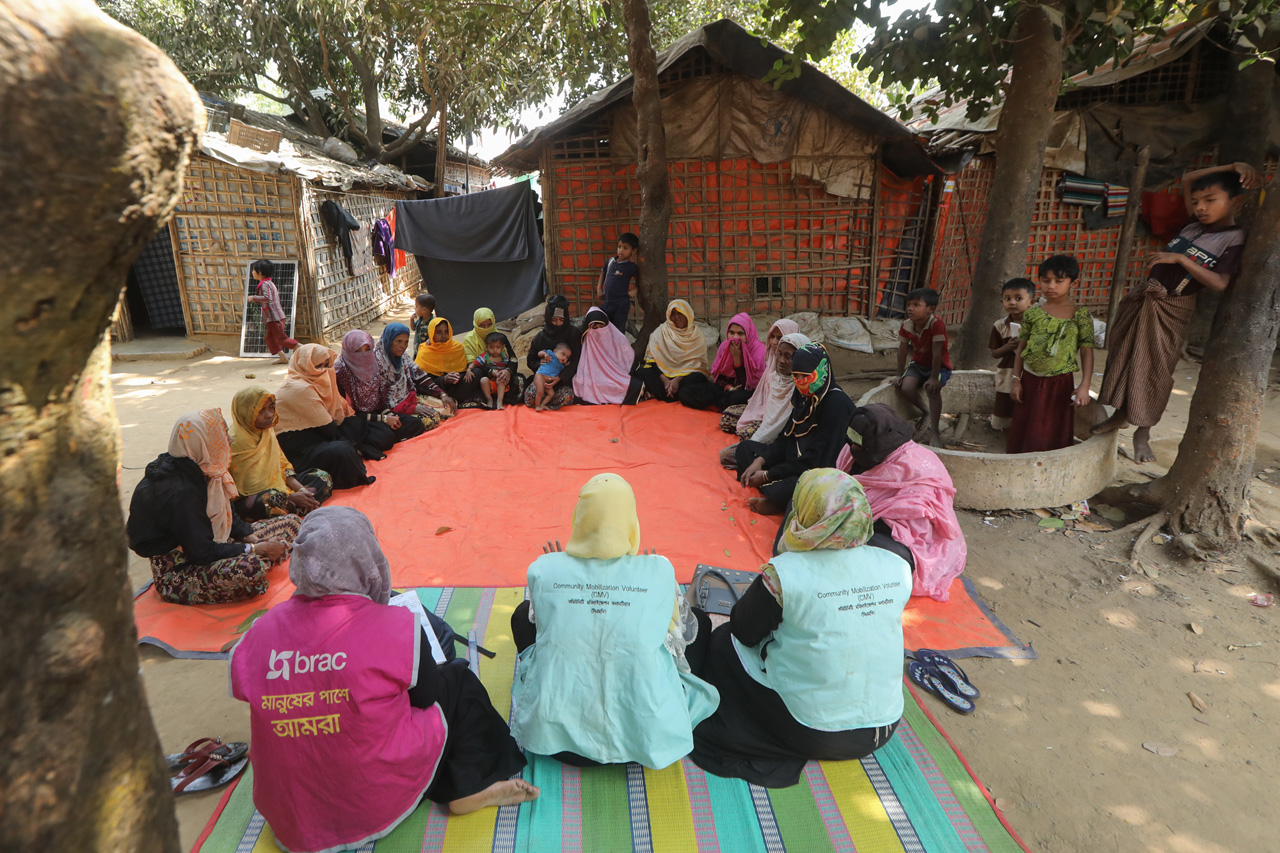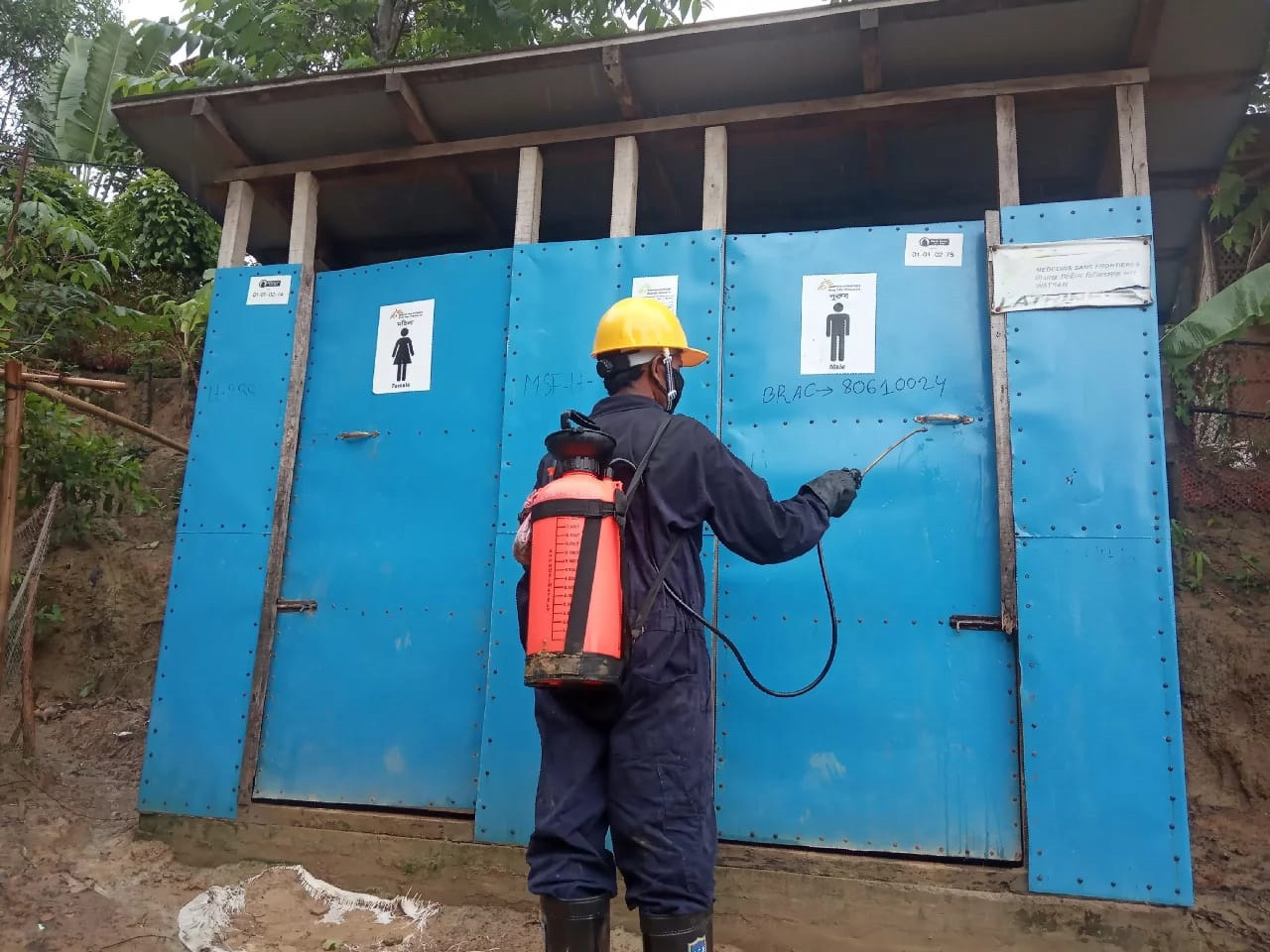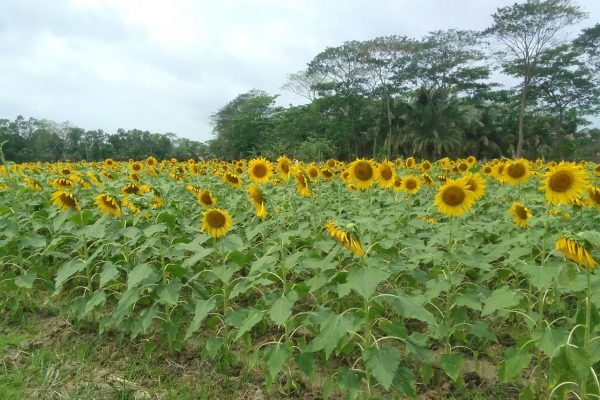Snapshot: 10 ways BRAC has been supporting Cox’s Bazar through the pandemic
Reading Time: 3 minutes
The COVID-19 pandemic created a crisis on top of a crisis in Cox’s Bazar, where almost a million people from the Rohingya community reside in makeshift camps. Here is a snapshot of how BRAC has been supporting the Rohingya and host communities in the region during the pandemic.
BRAC’s work in Cox’s Bazar is based on ensuring that sustainable humanitarian support is always available to save lives, alleviate sufferings and maintain human dignity. During the COVID-19 pandemic, these concerns became more grave. This article outlines the work that has been done to ensure basic needs, safety and security, and socioeconomic opportunities in the camps and the host community for more than 1 million people.
1. Volunteers and community radio messages
Throughout the pandemic, 1.4 million people received life-saving awareness messages on COVID-19 safety and prevention, through volunteers and community radios. It was seen that misinformation was just as harmful as the virus itself. Volunteers got to work by miking in public spaces to spread basic safety guidelines. They also spread these messages through local radios so that people do not become complacent and are active in their communities’ safety.

Volunteers spreading safety messages.Photo credit:Alal Ahmed©BRAC
Read more: Community-based healthcare for COVID response: option or necessity?
2. Raising awareness
Around the Rohingya and host communities, more than 93,000 awareness posters, stickers and leaflets were distributed and plastered. These acted as visual cues to remind people to remain vigilant and adhere to the safety guidelines for COVID-19. It was observed that when people are told to follow safety precautions, they usually follow them for a few days and then they stop. This is because they are not constantly reminded of the guidelines. These posters played a vital role in making sure people do not forget to stay safe.
3. Food and cash distribution
Over 351,100 people in Cox’s Bazar’s host community were supported through cash distribution. This was done to alleviate the stress and uncertainty they faced as an impact of the shutdowns due to the pandemic. During a crisis access to safe and nutritious food becomes even more crucial, as resources start to deplete. Rice and high energy biscuits were distributed to more than 117,100 people.
4. Supporting systems
BRAC provided 6,200 trained volunteers and medical items to support the civil surgeon’s office in Cox’s Bazar. When the healthcare system was stretched to its limits during the pandemic, volunteers continued to provide support to ensure health does not take a back seat.

Lab technician collecting blood samples for general investigation.Photo credit: Alal Ahmed©BRAC
5. Isolation and treatment centre
BRAC constructed a 150-bed severe acute respiratory infection (SARI) isolation and treatment centre in Ukhiya. Patients who are diagnosed with COVID-19 are admitted to the centre where they receive the treatment they need. The facility also functions as an isolation ward to ensure quarantine guidelines are maintained.
Read more: Stepping up hand hygiene: How to make hand hygiene more accessible and inclusive
6. Community-based entrepreneurship
To strengthen protection against COVID-19, 472,600 masks were produced by women from the Rohingya and host communities. They received training from the Ayesha Abed Foundation and UNHCR. The initiative supported women to build a marketable skill and also earn a livelihood.
7. Strengthening hygiene habits
BRAC installed 1,500 handwashing stations and temperature screeners at every entry point in the Rohingya camps. The handwashing stations are placed in public spaces so that everyone has easy access to them. Regular disinfection of latrines, bathing cubicles, tap stands and other WASH facilities are carried out everyday in the Rohingya camps and host communities.
8. Water purification
Chlorine buckets and aqua tablets for water purification were distributed at household levels in the camps and the host community. All of our preventative measures to fight the virus rely on hygiene and sanitation, and both of these things need water. As such, water purification was a major priority. Volunteers went to households and demonstrated how to use the chlorine to clean and use aqua tablets.

Disinfection of WASH facilities.Photo credit: Alal Ahmed©BRAC
Read more: Back to school again: Assessing what students missed during school closings for COVID-19
9. Pashe Achhi (Beside You) – innovative remote learning model
Pashe Achhi was created as a remote learning model with psychosocial support for children and caregivers. This phone-based learning service ensured that students continued education and were able to share any stress or anxiety they may be going through. The operators were trained on how to give psychosocial aid to children as well as their caregivers.
10. Ensuring access to hygiene products
Soap, hygiene kits and menstrual hygiene kits were distributed regularly in the camps and the host communities. Even in the middle of a pandemic, people have the right to keep themselves clean and live with dignity. To ensure that the people living in Cox’s Bazar who were not able to buy hygiene supplies either due to unavailability or because they could not afford them, still had access to these things, volunteers went to households and distributed these items to those who needed them.
There is always enough room for everyone to live with dignity. If we allocate resources based on those who need it the most, a peaceful coexistence can be achieved for everyone.
Abdullah Al Rashed is a Communication Specialist at BRAC Humanitarian Crisis Management Programme (HCMP), Cox’s Bazar. Asif Mustafa is a Communication Specialist at BRAC Communications.
BRAC Humanitarian Crisis Management Programme (HCMP) has been working to ensure basic needs, safety and security, socio-economic opportunities in the camps and the host community for more than 1.3 million people, after an influx of forcibly displaced Myanmar nationals took refuge in Cox’s Bazar, Bangladesh.
Cover Photo:





